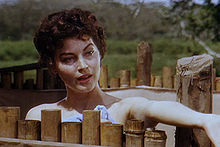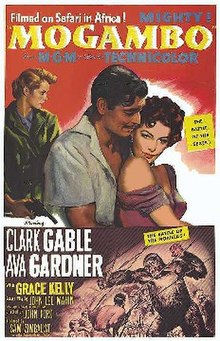|
Mogambo
Mogambo is a 1953 Technicolor adventure/romantic drama film directed by John Ford and starring Clark Gable, Ava Gardner, and Grace Kelly, and featuring Donald Sinden. Shot on location in Equatorial Africa, with a musical soundtrack consisting entirely of actual African tribal music recorded in the Congo, the film was adapted by John Lee Mahin from the play Red Dust by Wilson Collison. The picture is a remake of Red Dust (1932), which was set in Vietnam and also starred Gable in the same role. Although the original trailer for the film explains that "Mogambo" means "the Greatest," in fact, the word "Mogambo" has no meaning at all. Producer Sam Zimbalist came up with the title by altering the name of the Mocambo, a famous Hollywood nightclub. Plot New York socialite Eloise "Honey Bear" Kelly arrives at a remote African outpost, looking for a rich maharaja acquaintance, only to find he has cancelled his trip owing to unrest in his realm.[2] While waiting for the next river boat out, she spars with hardworking big game hunter and wild animal catcher Victor Marswell from the United States, who initially views her as disreputable. Marswell's business partner is plucky Englishman and big game hunter John Brown-Pryce, known as "Brownie." "Brownie" is sympathetic to Kelly, and believes that her "scars aren't visible, but they're there." Marswell also has a semi-hostile relationship with his employee, the gruff Russian Leon Boltchak. Kelly and Marswell later develop a mutual attraction and make love. Then the river boat brings London couple Donald Nordley and his wife Linda. Honey Bear takes the steamer out with the British skipper at Marswell's urging, although she would prefer to stay with Marswell and he expresses some regret at their parting. The Nordleys wish to go on safari to record the cries of gorillas. Marswell declines to guide them there due to the difficulties involved and insists that they be guided on the agreed route by his assistant, despite the Nordleys' protests. Honey Bear rejoins the group after the steamer suffers engine failure and subsequently runs aground.  Marswell rescues Linda from a panther, and Honey Bear sees that they are attracted to one another. After Marswell talks to Linda privately, he agrees to take the Nordleys into gorilla country, while also taking Honey Bear part of the way to join the district commissioner, who can then take her back to civilization. However, they find the commissioner mortally wounded by recently belligerent Samburu tribesmen. With reinforcements days away, the small party narrowly escapes, taking the commissioner with them. Meanwhile, a serious romance is developing between Marswell and Linda. Only Donald is blind to the situation. Marswell plans to tell him about how he and Linda feel, but has second thoughts after realizing how much Donald loves his wife and perhaps how she would be better off remaining with him. The situation is aggravated when Marswell reluctantly shoots a gorilla to save Donald, blowing a chance to capture a baby gorilla. Marswell goes back to camp, depressed, and begins drinking heavily in his tent. Honey Bear joins him. When Linda appears, she finds them cuddling. Marswell decides he can fix everything by making Linda hate him and makes a show of this cuddling followed by dismissive remarks about Linda's infatuation with "the White Hunter" to enrage her. Unfortunately, his ploy works too well when Linda shoots him with his own pistol, wounding him in the arm. Honey Bear lies to the others, telling them that Marswell had been making advances to Linda for some time, finally forcing Linda to shoot him in his drunken state. The next day, the party breaks camp to head back, leaving Marswell behind to try to capture young gorillas to pay for the safari. Marswell, acknowledging to himself his feelings for Honey Bear, asks her to stay and then proposes to her, but she rebuffs him. As the canoes set off, however, she suddenly jumps into the water and wades her way back to him. Cast
Production DevelopmentIn 1946, the Los Angeles Times reported MGM was considering remaking Red Dust with Marilyn Maxwell as a possible star.[3] In March 1948, Marie McDonald reportedly screen tested for the Jean Harlow part.[4] In May 1949, Maxwell and Gene Kelly were being considered for lead roles.[5] The studio had a great deal of success with color remakes of older films shot on location overseas, including King Solomon's Mines (1950) and Quo Vadis (1951). In August 1951, MGM announced it would make Mogambo, shot on location in Africa. The producer would be Sam Zimbalist who had made King Solomon's Mines, and the star would be Clark Gable.[6] In February 1952, Zimbalist scouted locations in Africa for six weeks. In June, John Ford agreed to direct.[7] CastingShelley Winters was mentioned as a possible co-star.[8] Patricia Neal also was discussed.[9] In June 1952, Ava Gardner signed. Grace Kelly was not the first choice for the role of Linda Nordley. Gene Tierney withdrew because she did not want to leave Aly Khan in Paris.[10] ShootingGable arrived in Kenya on 1 November 1952 and was given an armed guard due to the Mau Mau Uprising.[11] Filming started 17 November. It was done on location in Okalataka, French Congo; Mount Kenya, Thika, Kenya — Mt Longonot, and Lake Naivasha, both in the Kenyan Rift Valley and Fourteen Falls near Thika are seen as backdrops — Kagera River, Tanganyika; Uganda. Samburu were filmed in front of Mount Sabachi near Archer's Post and Isiolo. Interiors were shot at the MGM-British Studios, in Borehamwood, Hertfordshire, England.[12] Frank Allen and his wife were guides during the six week-safari that constituted location filming.[13] The shoot was difficult. There was a rumor Clark Gable was going to be assassinated by the Mau Mau, so John Ford moved a location. Two of the crew were revealed to be Mau Mau.[14] The unit was plagued by rain and had a deleterious effect on the already poor quality of the roads. Three of the crew were killed in road accidents, including assistant director John Hancock.[15][16] Donald Sinden, then a contract star for the Rank Organisation at Pinewood Studios, recalled:
Post-productionThe music featured in the film was performed by local native tribes (except for Gardner accompanied by player piano), unusual for Hollywood, and the film records a traditional Africa and safari style. Francoist Spanish censors would not allow adultery to be shown onscreen. For this reason, they changed the relationship of the characters of Linda Nordley (Kelly) and Donald Nordley (Sinden) from wife and husband to sister and brother in the dubbed version released in Spain, thus necessitating the removal of a bedroom scene in which only one bed is present. ReceptionThe film was a hit — according to MGM records it made $4,576,000 in the US and Canada and $3,692,000 elsewhere, resulting in a profit of $2,026,000.[1] In his October 2, 1953 review for The New York Times, Bosley Crowther observes that the film “has a great deal more to do with the low-down romantic maneuvering of two colorful and popular stars than with the thrills of adventuring in Africa, …Some handsome color shots of open country are slipped in from time to time, ... But the interest is basically centered in the civilized stalking of the stars. And it is meant as no insult to Mr. Gable to say that he is the most important gorilla bagged. In the advancement of the romance, which itself is hot stuff, for what it is, several capable actors do entertaining jobs. Mr. Gable is beautifully commanding, in his vicious, sardonic way, and Miss Gardner, as we say, is as enticing as any calculated vampire can be. …Grace Kelly as the stuffy English dame, Donald Sinden as her pip-pip hubby and Eric Pohlmann as a hand are all right, too. The trouble is simply that more of them meant less of the animals.”[18] James Bacon, writing a capsule review for the AP's Bob Thomas' Hollywood on September 16, 1953, had a similar reaction: “It seems everybody both here and around the country has been hoping Clark Gable would get a good picture. King Gable actually hasn't had one good movie since his return from World War II service. He's got it now in "Mogambo," even though it's a remake of "Red Dust" one of his greatest hits of the '30s. Gable is virile as ever and makes lusty love to Ava Gardner as well as he did to Jean Harlow when he was a much younger man.”[19] It has a 75% rating on Rotten Tomatoes, based on 12 reviews.[20] Awards and honorsGrace Kelly won a Golden Globe Award for Best Supporting Actress, and the film was nominated for two Oscars: Best Actress (Gardner) and Best Supporting Actress (Kelly). The film also was nominated for a BAFTA Award for Best Film. Notes
External linksWikimedia Commons has media related to Mogambo (film).
|
||||||||||||||||||||||||||||||||||||
